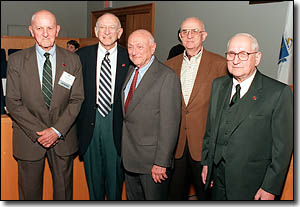Defenders of a radical idea

It was a radical idea at the time.
The concept of Law School (HLS) students representing indigent clients in criminal cases may have shocked more than a few people in the Boston legal community in 1949, but more than a half century later, the Harvard Defenders carries on in its benevolent mission in district courts throughout the Commonwealth.
Last weekend, five of the original Defenders Sam Dash 50, Efrem Gordon 50, A. Paul Goldblum 50, Myron Boluch 50, and Hershel Sarbin 50 joined about a hundred of their successors at a Harvard reunion marking the organizations 50th anniversary. The agenda included an open house, a symposium titled “Ethics in the Trenches,” a formal dinner and dance, and a tribute to the Defenders class of 1950.
“What a wondrous occasion,” said Jack Litman 67, the reunions honorary chairperson. “To honor the men who helped set this all up is wonderful.”
Dash, who later gained prominence for his role as the chief counsel of the Senate Watergate Committee, was an eager third-year law student when he joined the crusade to make the Harvard Defenders dream a reality. “When I was here, the school didnt emphasize criminal law, and that was something I was always interested in and in 1949, there werent any other groups like this one anywhere in the country,” he explains.
Dash envisioned a scenario allowing HLS students to gain practical legal experience assisting destitute clients who had nowhere else to turn for help.
The clients were easy to find once Dash approached Wilbur Hollingsworth, who ran the office of the Boston Voluntary Defenders, a small group of attorneys who worked with accused criminals who could not afford representation. Hollingsworth admits he was initially skeptical about using HLS students, but later acceded after realizing they could perform some valuable functions for an overworked office.
‘A Lot of Listening’
“We only had two lawyers in the office at the time working with me, handling about 400 cases a year,” Hollingsworth says. “Our caseload was building up, and I just didnt have time for anything.”
A group of 10 students was selected to work with the Voluntary Defenders in 1949. Dash winces as he recalls the less than ideal working conditions. “When we started, we had no offices. We used to meet in empty classrooms. I used to use a bulletin board to give assignments to my fellow Defenders,” he says.
Despite the accommodations, the organization thrived. “We were [Hollingsworths] hands and feet and eyes. We visited his clients in jail. We wrote his trial memos. We interviewed the witnesses,” Dash explains. “We put him in a position where he could actually be a lawyer and try cases. His caseload was so overwhelming that it was almost impossible for him to give the kind of representation that [his clients] desired, so we made the difference.”
Hershel Sarbin, who jokes that he was “recruited at a weak moment by Sam Dash,” says he “enjoyed every minute” working with the Defenders. “It really was we happy few who were there. We did a lot of listening, which is really not a bad idea when youre involved in that business, and it was a very good thing. We didnt have a lot of time to think about what we were doing. It was a very action-oriented kind of thing.”
In the early years, the student Defenders were limited to writing briefs and conducting jailhouse interviews, but later, third-year law students were allowed to appear at court hearings and trials. It wasnt until 1960 that the Boston Voluntary Defenders was mandated as a state agency, and began receiving public funding.
Glory, Thrill, but No Carbon Paper
In 1963, the legal landscape changed tremendously when the U.S. Supreme Court issued its landmark ruling in Gideon v. Wainwright, stating that all low-income defendants in criminal cases had a constitutional right to a court-appointed attorney. The Defenders were soon called upon to handle post-conviction appeals from all over the country. These days, the workload encompasses “everything from shoplifting to sex offenses,” according to HLS Clinical Instructor John Salsberg.
Former Massachusetts Attorney General Scott Harshbarger 68, the current president and chief executive officer of Common Cause, was president of the Harvard Defenders during his final year in law school. “We handled a lot of the protest cases. We were going to court, and it was a very exciting time, and you were feeling that your legal education was actually relevant to something.
“This experience was very important to me,” Harshbarger states. “It was very influential in how I thought about what I wanted to do as a lawyer.”
Another former Defenders president, Page Kelley 86, now the attorney in charge of the Cambridge office of the Committee for Public Counsel Services, believes her experience with the organization left an indelible impression on her psyche. “The Harvard Defenders totally directed my career choice. I had such a great time there, and it was so exciting to do the work with the organization that I went on to become a public defender.”
Today, the Harvard Defenders has more than 70 active members, working on a variety of cases, sharing a bank of computers and desks in a multi-room suite at Austin Hall. Its a far cry from the early days when, according to Litman, they “had no resources, no office, no secretary, no typewriters, no carbon paper, no telephones, no course credits, nothing, nothing but the glory and the thrill of the challenge of helping poor people secure at least a piece of justice.”
It is that same glory and thrill that sustains the Defenders 50 years later, thanks to Dash, Sarbin, and those other early pioneers who blazed the way for future law students with a passion for criminal law and compassion for those in need.




